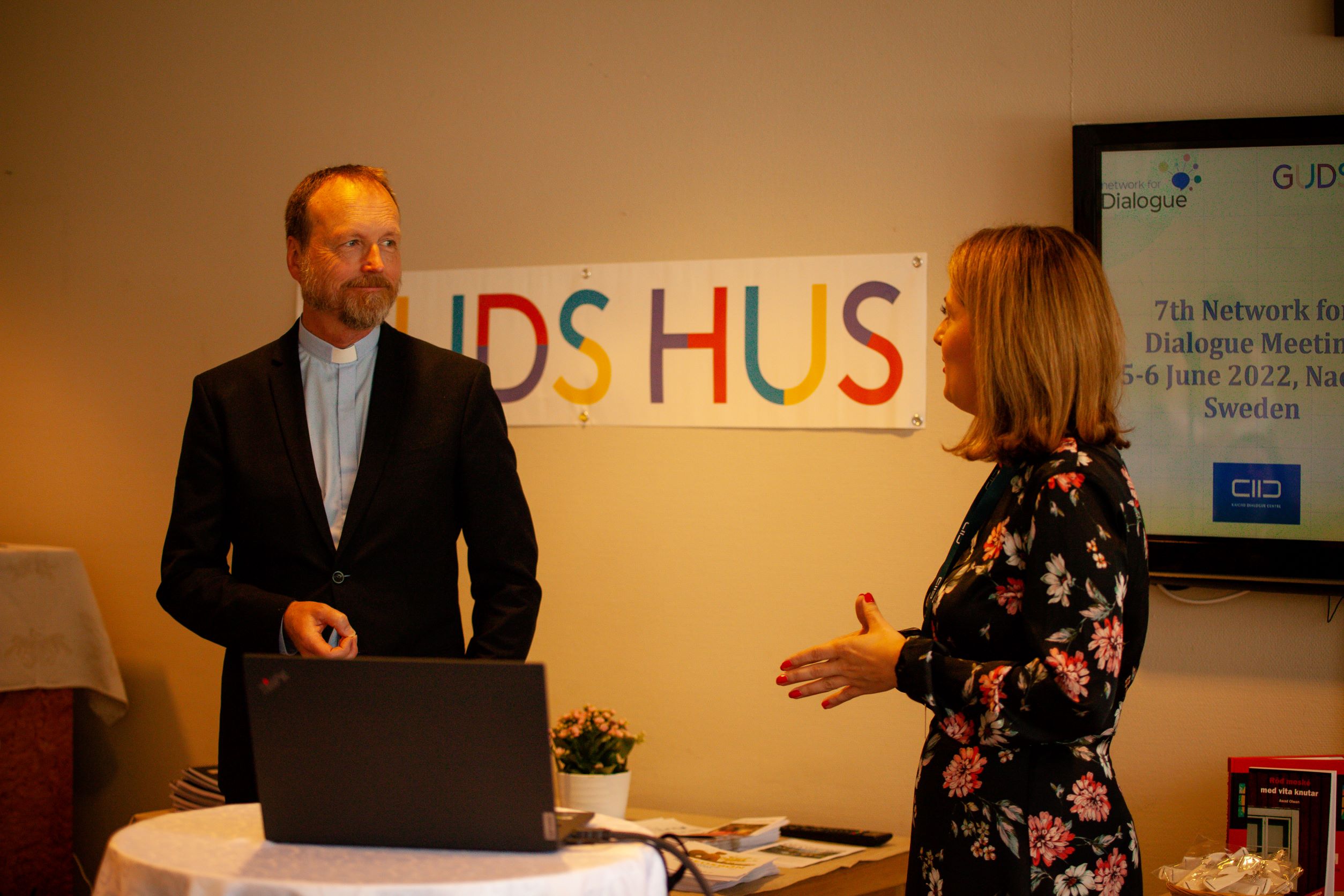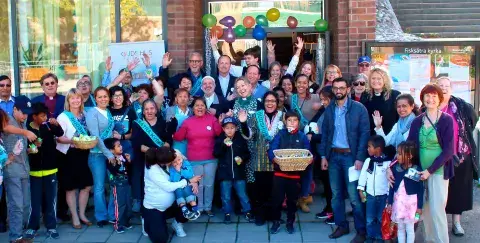
In 2015, as many European countries tightened borders against the surge of refugees fleeing conflict in the Middle East, Swedes were taking immense pride in their government’s decision to accept 163,000 new arrivals.
Today, however, attitudes have changed. The far-right Sweden Democrats garnered strong support from voters earlier this month after publishing a 30-point plan aimed at making the country’s immigration rules among the most restrictive in the EU. Party politicians have called for rejecting asylum seekers based on religion, gender or sexual identity.

“The thought of people coming from other countries is a threat,” says Carl Dahlbäck, Vicar at Nacka Parish outside of Stockholm. “But this is an example of what happens when people haven’t shared encounters with each other.”
Dahlbäck has worked in interfaith dialogue for over two decades, helping Sweden’s predominately Christian population open their hearts and church doors to outsiders.
In 2003, long before the refugee crisis, Dahlbäck’s parish and the local Muslim Association hosted common prayers on the local soccer field during Pentecost. The event was so successful, it spurred a series of interfaith gatherings. As hunger for dialogue grew in the local community, Dahlbäck launched God’s House – an interreligious meeting space for Swedish Christians and Muslims – in 2009.
His chosen location was Fisksätra, Sweden, which is home to 8,000 people from more than 80 different nations. The community is a symbol of how Sweden’s historically homogenous population is rapidly changing, he says.
“We’ve had a lot of refugees coming to Fisksätra,” Dahlbäck said. “When the 2015 crisis hit, Nacka Parish and other churches offered room in their homes and families to help them.”
God’s House, in particular, became an important beacon for newly arrived Muslims seeking sanctuary in Sweden’s suburbs. “It was important for Christian believers who had never met refugees to get to know them. Their friendship grew and we still have great relationships,” he said.

As birth rates decline, the influx of refugees has rewritten the Sweden’s demographic destiny. Today, the country’s Muslim population totals 810,000, or 8 per cent of Sweden’s 10 million inhabitants. Projections show that the Muslim population could grow anywhere from 11 per cent to 31 per cent by 2050, depending on continued rates of migration.
Because of the country’s small population, Pew Research reports that migration has had a bigger impact on Sweden’s religious composition than in larger Western European countries.
In Fisksätra, the signs of a changing Sweden are evident. Roughly 40 per cent of the community identifies as Muslim, compared to 40 per cent Christian and 20 per cent that identify as other or non-religious.
The transformation has not been easy, says Dahlbäck, with many immigrants feeling excluded and marginalised. Interreligious dialogue has been vital to keeping peace within the community.
“The work we are doing in Fisksätra is exactly what’s needed in the suburbs. Diverse stakeholders, including civil society organizations and religious associations are coming together to create a better society based on human rights. We want people to successfully integrate so they can contribute to their communities and have meaningful lives.”
In many parts of Sweden, refugees are isolated, living in lower-income neighborhoods and choosing to be close to family and others who speak their own language as they navigate life in a foreign land. But the separation often leads to distrust, Dahlbäck says, which can quickly morph into discrimination, hate speech and even violence.
Young people between 14 to 17 years of age are particularly at risk for criminality and drug use, he adds. Last year, Nacka municipality provided God’s House with funding for a programme designed to give young people a sense of purpose and keep them from becoming vulnerable to gang recruitment.
Participants earn wages in exchange for community service activities, such as cleaning, gardening, painting, serving food, helping the homeless and picking up trash, which are organized by the local church. They also receive mentoring and support to finish their studies and pursue successful careers.
“We wanted to teach them to take care of themselves and others and to consider the opportunities they have for the future,” Dahlbäck said.
God’s House has also reached out to refugee women who are often isolated at home, tasked with raising children and taking care of household duties, which makes it difficult to expand their social circles. The interfaith meeting space offers dialogue sessions for Muslim women as well as interreligious sessions with Christian women.
“It’s a chance for them to take off their hijabs and speak woman to woman. The dialogues allow them to really get to know each other and find friendship and support,” Dahlbäck adds.
While God’s House has received positive encouragement from the local community, staff members have also been confronted with violent Islamophobia, xenophobia and racism – particularly from right wing nationalist groups.
Figuring out how to smooth integration processes for Sweden’s refugee community amid a minefield of contentious political issues left Dahlbäck and his team searching for advice.
They found it in the KAICIID-supported Network for Dialogue which connects religious organizations, like God’s House, as well as academics and policymakers working in the field of integration. Network members and partners also include well-established refugee aid and dialogue organizations such as ADRA, Jesuit Refugee Service, Arigatou International, HIAS Europe, Islamic Relief and The International Federation of the Red Cross (IFRC).
“It’s nice to meet other people from Europe who do the same thing we do. We inspire each other to move forward and give each other the hope to continue,” Dahlbäck said.
Earlier this year God’s House hosted one of the Network’s regular meetings as well as a preparatory workshop for the upcoming European Policy Dialogue Forum which will be held in Barcelona later this year. Over the course of two days, participants addressed challenges for refugees and migrants which are emerging across European cities, including a rise in hate speech and discrimination.

“So many Network members from other countries visited us for the workshop. Often you can end up in a kind of bubble within your own work, but when you go to Network conferences you are exposed to a bigger world of other organizations tackling the same challenges you are,” Dahlbäck said.
Despite the country’s current struggle with integration, Dahlbäck has ambitious plans to unite Fisksätra’s diverse communities. Currently he is working on expanding God’s House in partnership with the local Muslim association. The building will consist of three parts: a church, mosque and a glazed central atrium called the ‘Peace Square’ which will link the two sides.
While the project has met with skepticism from some, Dahlbäck hopes it will help open the community’s eyes to the beauty of diversity.
“In a secular country like Sweden, people are often afraid of meeting believers from other religions because they have little knowledge about our country’s Christian traditions or religion in general. They think dialogue means changing your mind about your faith or losing your own religion. But that is mistake. Being in dialogue with other religions helps you to learn so much more about your own beliefs,” he says.
Dahlbäck also hopes the new interreligious space will help Fisksätra successfully navigate its changing demographics.
“Every tradition, culture and religion changes with society, with time, with new values. It’s a misunderstanding to think that we cannot change. We must believe we can change. We will change.”